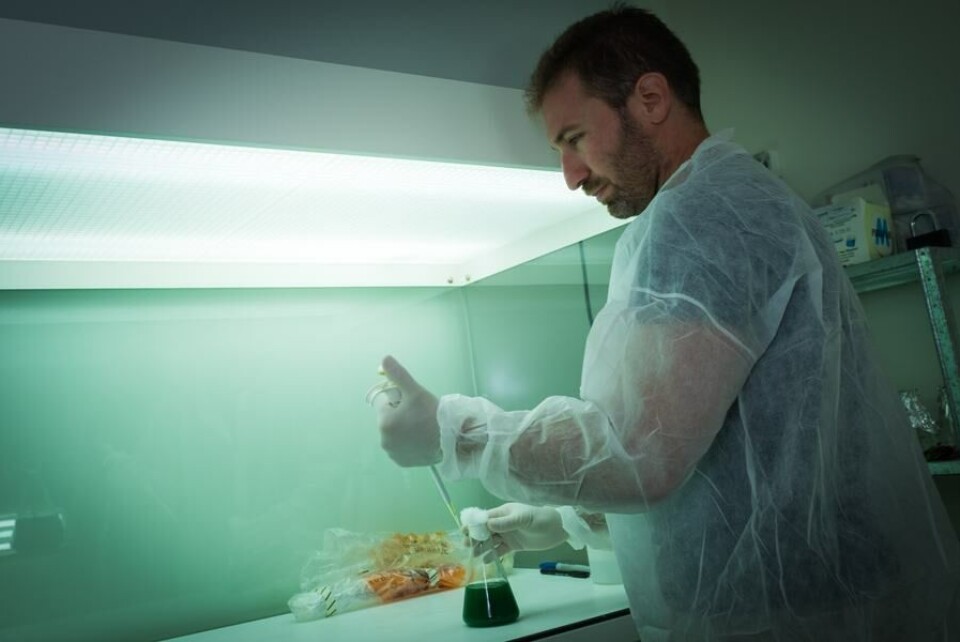
From algae to ‘smoked salmon’ (without the fish)
Just as the salmon farming world is getting used to the idea of cutting out the middleman by replacing fishmeal and oil with omega 3-rich algae, an Israeli algae grower is going a step further – by cutting out the salmon!
Foodtech start-up SimpliiGood, owned by Algaecore Technologies Ltd, has teamed up with international food conglomerate IFF to develop the first commercial smoked salmon analogue made entirely from a single ingredient: whole fresh spirulina.
According to SimpliiGood, the plant-based salmon-like cut is uniquely crafted to take on the appearance, colour, texture, and flavour of smoked salmon.
40% protein
Composed of 100% minimally processed spirulina, it is a clean-label product and is 40% complete protein.
An agreement for strategic cooperation has been signed between the Israeli Innovation Authority, SimpliiGood, and FoodNxt—the innovation lab established by IFF. SimpliiGood provides the raw material and texture and colour qualities, while IFF contributes the flavour and aroma attributes. The product is expected to hit the market by the end of 2023.
The new salmon analogue will join a series of existing spirulina-based SimpliiGood branded products marketed in Israel to food producers and directly to consumers. Its current portfolio encompasses a range of meat substitutes, including hamburgers and chicken nuggets, as well as popsicles, ice cream, crackers, and beverages where spirulina serves either as the base ingredient or as nutritional enrichment.
Neutral flavour
“Our spirulina can act as a complete replacement for animal-based protein or be easily integrated into existing food products as an added-value ingredient, as it has a neutral flavour and maintains its full nutritional value,” said Lior Shalev, chief executive and co-founder of Algaecore, in a press release. “This project marks an exciting milestone in our company’s product line expansion as we enter the fish substitute market.”
In the first phase, the company will focus on producing a pure, spirulina-based smoked salmon analogue, with plans to expand to additional fish analogues in the future.
SimpliiGood says spirulina is one of the most nutrient-dense plant-based forms of protein on the planet, being a naturally rich source of whole protein, plus antioxidants, chlorophyll, vitamins, (including B12), and minerals, especially iron. The spirulina market is relatively young and is dominated by dried and powdered forms of the ingredient. SimpliiGood cultivates and markets a specific strain of 100% raw fresh spirulina that boasts 90% bioavailability, making it a powerful addition to any food application
Natural pigment
The new, salmon-like creation is based on two intellectual property-protected technological breakthroughs developed by the algae innovators. The first applies to its texturisation platform for forming salmon-like chunks solely from spirulina and having the same mouthfeel as the animal form. Its orange, salmon-like hue has been expressed through identifying and isolating the native beta carotene pigment naturally present in spirulina.
SimpliiGood cultivates its spirulina in a system of 90m³ capacity ponds housed in greenhouses situated in the southern desert region of Israel, and recycles 98% of the water used in the process. The company produces 50 tons of spirulina per year, with a harvest every 24 hours.
Sunshine to protein
“The spirulina SimpliiGood cultivates is one of the most efficient converters of sun energy into protein,” said Shalev. “Spirulina requires salt, minerals, heat, CO₂, and water to thrive. The process of growing spirulina actually captures carbon and uses it to grow.
“The strain that the animal food industry places on the environment and food security has elevated the need to develop sustainable protein substitutes. We are excited to collaborate with these leading global food industry players to bring a tasty and highly nutritious product to consumers worldwide, without harming animals or the planet.”























































